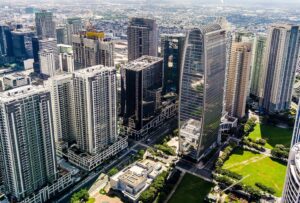Are you considering renting a property in Manila but don’t know where to begin? Navigating the dynamic real estate market of the Philippines’ capital can be both exciting and challenging. From understanding legalities to finding the perfect location, here are five crucial factors to consider to ensure a smooth renting experience.
- Location, Location, Location
Choosing the right location is paramount when renting a property in Manila. The city is a sprawling metropolis composed of several districts, each with its unique character, advantages, and challenges.
Consider Proximity to Work and Amenities
- Traffic Concerns: Manila is notorious for its traffic congestion. According to a 2019 study by the Asian Development Bank, Metro Manila ranks among the most congested cities in Asia. Selecting a property close to your workplace or with easy access to public transportation can save you hours in daily commute.
- Access to Essentials: Ensure that essential services like supermarkets, hospitals, schools, and recreational facilities are nearby. Neighborhoods like Makati, Bonifacio Global City (BGC), and Ortigas are known for their comprehensive amenities and are popular among expatriates and professionals.
Understand the Neighborhood
- Safety: Research the safety of the area. Websites like Numbeo provide up-to-date information on crime rates and safety indices for various parts of Manila.
- Lifestyle Fit: Choose a neighborhood that matches your lifestyle. For a vibrant nightlife and dining scene, areas like Poblacion in Makati or BGC might be ideal. If you prefer a quieter environment, consider residential districts like Alabang or New Manila.
- Budget Wisely: Understanding Rental Costs
When renting a property in Manila, carefully consider all expenses beyond the monthly rent:
- Rental Prices Vary
- Location Matters: Prime areas like Makati, BGC, and Ortigas may have higher rents due to proximity to business districts and amenities.
- Property Type and Amenities: High-end condos with amenities (pools, gyms, security) also cost more than basic apartments.
- Advance and Security Deposits
- Advance Rent: Typically one to two months’ rent paid upfront.
- Security Deposit: Usually equivalent to two months’ rent; refundable if lease terms are met and property is in good condition.
- Additional Expenses
- Association Dues: Monthly fees for maintenance of common areas in condos.
- Utilities: Electricity, water, internet, and cable TV are usually not included in the rent.
- Parking Fees: Check if parking is included or if additional fees apply.
- Currency Considerations for Expatriates
- Exchange Rates: Fluctuations can affect rental costs over time; monitor rates if your income is in another currency.
- Negotiating Rent
- Potential Flexibility: Landlords may negotiate rent or terms, especially for longer leases.
- Positive Relations: Approach negotiations respectfully to maintain a good relationship with your landlord.
Additional Expenses
- Association Dues: For condominium units, expect monthly association dues that cover maintenance of common areas and amenities.
- Utilities: Electricity, water, internet, and cable TV are usually not included in the rent.
- Parking Fees: If you have a vehicle, inquire about parking availability and any associated costs.
Exchange Rates for Expatriates
- Currency Fluctuations: If you’re an expatriate, keep in mind that exchange rate fluctuations can affect your rental expenses over time.
- Legalities and Documentation
Understanding the legal aspects of renting is essential to protect your rights as a tenant.
Lease Agreement
- Read Carefully: The lease agreement outlines the terms and conditions of your tenancy. Ensure all details are clear, including the duration, payment terms, and responsibilities.
- Key Clauses: Look out for clauses on repairs and maintenance, renewal terms, subletting, and termination conditions.
Tenant and Landlord Rights
- Know Your Rights: The Philippines has laws that protect both tenants and landlords. Republic Act No. 9653, also known as the Rent Control Act of 2009, regulates rent increases for properties within a certain rental range.
- Dispute Resolution: In case of disputes, it’s advisable to resolve issues amicably or seek assistance from local barangay officials before escalating to legal action.
Documentation
- Proper Identification: Landlords may require valid IDs, proof of income, or employment certificates.
- Official Receipts: Always request official receipts for any payments made.
- Inspect the Property Thoroughly
Before signing any agreement, it’s crucial to inspect the property to ensure it meets your expectations and is in good condition.
Check for Structural Integrity and Maintenance
- Structural Issues: Look for signs of damage such as cracks, leaks, or mold.
- Fixtures and Appliances: Test all appliances, faucets, electrical outlets, and lighting fixtures to ensure they are functioning properly.
Amenities and Services
- Building Amenities: If renting in a condominium, check the condition of amenities like the gym, pool, and common areas.
- Security Measures: Ensure the property has adequate security features such as locks, security guards, and CCTV cameras.
Neighborhood Visit
- Visit at Different Times: Visit the property at various times of the day to gauge noise levels and traffic conditions.
- Talk to Residents: If possible, speak with current residents or neighbors to gather insights about the property and landlord.
- Engage with Reputable Real Estate Professionals
Working with trusted real estate professionals can simplify the process of renting a property in Manila.
Licensed Real Estate Brokers and Agents
- Expert Guidance: A licensed broker can provide valuable advice, negotiate on your behalf, and help you find properties that match your criteria.
- Avoid Scams: Unfortunately, rental scams exist. Verify the credentials of the agent and never make payments without proper documentation.
Online Platforms
- Reputable Websites: Utilize established real estate websites like ph to search for listings.
- Reviews and Ratings: Check reviews or ratings of agents and properties where available.
Legal Assistance
- Consult a Lawyer: If you’re unfamiliar with local laws or have specific concerns, consulting a legal professional can provide peace of mind.
Conclusion
Renting a property in Manila can be a rewarding experience when you’re well-prepared and informed. By considering the location, budgeting wisely, understanding legalities, thoroughly inspecting the property, and engaging with reputable professionals, you can find a home that suits your needs and enhances your stay in this dynamic city.
Whether you’re a local resident or an expatriate, Manila offers a diverse range of rental properties that cater to different lifestyles and preferences. Take the time to research and plan, and you’ll be well on your way to finding the perfect place to call home.



